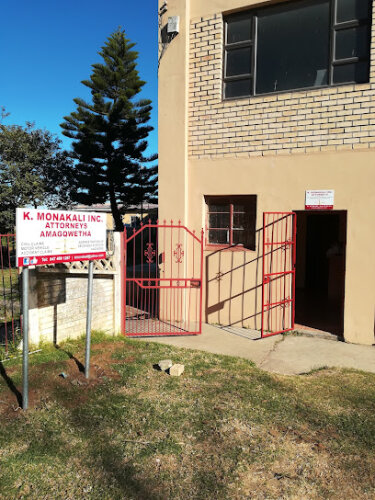Best Property Damage Lawyers in East London
Share your needs with us, get contacted by law firms.
Free. Takes 2 min.
List of the best lawyers in East London, South Africa
About Property Damage Law in East London, South Africa
Property damage law in East London, South Africa, concerns the legal rules and procedures for addressing destruction, loss, or damage to personal or real property. This area of law covers events like vandalism, accidental damage (for example, from a car accident), weather-related destruction, neighbor disputes, or contractor negligence. In most instances, property owners have a legal right to restitution or compensation if their property is unlawfully damaged, whether intentionally or through negligence. Both criminal and civil laws may apply, and responsibilities can involve individuals, businesses, or government entities.
Why You May Need a Lawyer
Property damage issues can be complex and stressful, often involving financial loss, insurance complications, and disputes over responsibility. Common scenarios where legal assistance is helpful include:
- Disputes with neighbors regarding boundary walls, fences, or trees causing damage
- Damage from motor vehicle accidents where compensation is contested
- Vandalism or malicious destruction of property
- Insurance claims being rejected or delayed
- Landlord-tenant conflicts involving damage to rental property
- Contractor-caused damage during renovations or repairs
- Disasters causing contentious claims, such as storms or flooding
A lawyer can help clarify your rights, gather evidence, negotiate settlements, or represent you in court should an amicable solution not be possible.
Local Laws Overview
Some important legal frameworks and principles relevant to property damage in East London, South Africa, include:
- Delict Law: South Africa’s law of delict (similar to tort law in other countries) governs claims for damage or loss caused unlawfully by another person. Victims can claim compensation (damages) if harm was due to someone else's wrongful or negligent act.
- Criminal Law: Intentional acts like vandalism are criminal offences under laws such as the Criminal Law Amendment Act and can be pursued through the police and criminal courts.
- Municipal Bylaws: The Buffalo City Metropolitan Municipality has local bylaws covering land use, building regulations, and public safety. Violation of these can sometimes lead to property damage.
- Insurance Regulations: The Short-Term Insurance Act governs how insurers handle property damage claims, with detailed requirements for both parties.
- Landlord and Tenant Law: The Rental Housing Act details rights and remedies for damage in rental properties.
Practical application of these laws often depends on the specific facts of each case and may require legal interpretation or intervention.
Frequently Asked Questions
What counts as property damage under South African law?
Any physical harm or alteration to property, caused intentionally, negligently, or accidentally by another person or entity, can be classified as property damage. This includes both real estate (land, buildings) and personal possessions.
What should I do immediately after discovering property damage?
Document the damage with photographs, secure the scene if possible, report the incident to the police if it appears criminal, and notify your insurance company promptly. If the damage was caused by a third party, obtain their details and, if possible, witness statements.
Can I claim compensation for emotional distress caused by property damage?
Typically, claims focus on actual loss or repair costs. Emotional distress may only be compensable in rare, extreme circumstances, and generally requires proof of significant mental harm directly linked to the incident.
What if my neighbor’s tree or wall causes damage to my property?
If negligence, encroachment, or unlawful conduct by your neighbor results in damage, you may have grounds to claim compensation under delict law. It is best to discuss the issue first with your neighbor but consult a lawyer if the matter is not resolved amicably.
How do I handle disputes with my insurance company after a property damage claim?
Ensure all claim steps and documentation requirements have been followed. If your claim is unfairly rejected or delayed, you may lodge a complaint with the Ombudsman for Short Term Insurance or seek legal advice for further action.
Is damage to rental property always the tenant’s responsibility?
Tenants are responsible for damage caused by their negligence or intentional actions, but landlords remain responsible for fair wear and tear, and structural repairs not caused by tenant actions. The specific lease agreement should outline these responsibilities.
Can I take criminal and civil action for property damage?
Yes, in cases of intentional damage (e.g., vandalism), a criminal case can be opened with the police. Simultaneously, you can pursue a civil claim for damages to recover your financial loss.
How long do I have to make a legal claim for property damage?
Generally, you have three years from the date the damage occurred to institute a civil claim. It’s advisable to act as soon as possible and seek legal guidance regarding time frames.
What if the damage was caused by a government entity or municipal worker?
Special rules apply, such as giving formal written notice of your intention to claim within six months, under the Institution of Legal Proceedings against Certain Organs of State Act. Immediate professional legal advice is strongly recommended.
Can I represent myself, or do I need a lawyer?
While you can handle straightforward, small claims yourself (such as in the Small Claims Court), complex or contested cases are best managed with the help of a lawyer, especially when significant sums or legal ambiguities are involved.
Additional Resources
If you’re seeking more information or assistance regarding property damage in East London, these resources may be of help:
- Buffalo City Metropolitan Municipality - for local bylaws and reporting municipal-related property issues.
- South African Police Service (SAPS) - for reporting criminal property damage like vandalism or theft.
- Ombudsman for Short Term Insurance (OSTI) - to resolve disputes with your property insurer.
- Rental Housing Tribunal (Eastern Cape) - for landlord-tenant property damage disputes.
- Legal Aid South Africa - for qualifying individuals needing free or low-cost legal advice.
- Department of Justice and Constitutional Development - for accessing the courts and understanding your legal rights.
Next Steps
If your property has been damaged in East London, South Africa, consider taking the following steps:
- Document the damage thoroughly and retain all relevant evidence and correspondence.
- Report the incident to the appropriate authorities (police, municipality, or insurance).
- Review your insurance policy and lease agreements (if applicable) to understand your rights and obligations.
- Try to resolve minor disputes directly with the other party if possible, while keeping a written record of all communications.
- If the dispute cannot be resolved, or the case involves significant damage, injury, or legal complexity, consult with a property damage lawyer in East London for tailored advice.
- Should you require legal aid or face financial constraints, approach organizations like Legal Aid South Africa or the relevant ombudsman as listed above.
- Act quickly, as time periods for making claims may apply.
Proactive steps and informed legal advice can help protect your rights, recover losses, and resolve property damage disputes effectively.
Lawzana helps you find the best lawyers and law firms in East London through a curated and pre-screened list of qualified legal professionals. Our platform offers rankings and detailed profiles of attorneys and law firms, allowing you to compare based on practice areas, including Property Damage, experience, and client feedback.
Each profile includes a description of the firm's areas of practice, client reviews, team members and partners, year of establishment, spoken languages, office locations, contact information, social media presence, and any published articles or resources. Most firms on our platform speak English and are experienced in both local and international legal matters.
Get a quote from top-rated law firms in East London, South Africa — quickly, securely, and without unnecessary hassle.
Disclaimer:
The information provided on this page is for general informational purposes only and does not constitute legal advice. While we strive to ensure the accuracy and relevance of the content, legal information may change over time, and interpretations of the law can vary. You should always consult with a qualified legal professional for advice specific to your situation.
We disclaim all liability for actions taken or not taken based on the content of this page. If you believe any information is incorrect or outdated, please contact us, and we will review and update it where appropriate.










